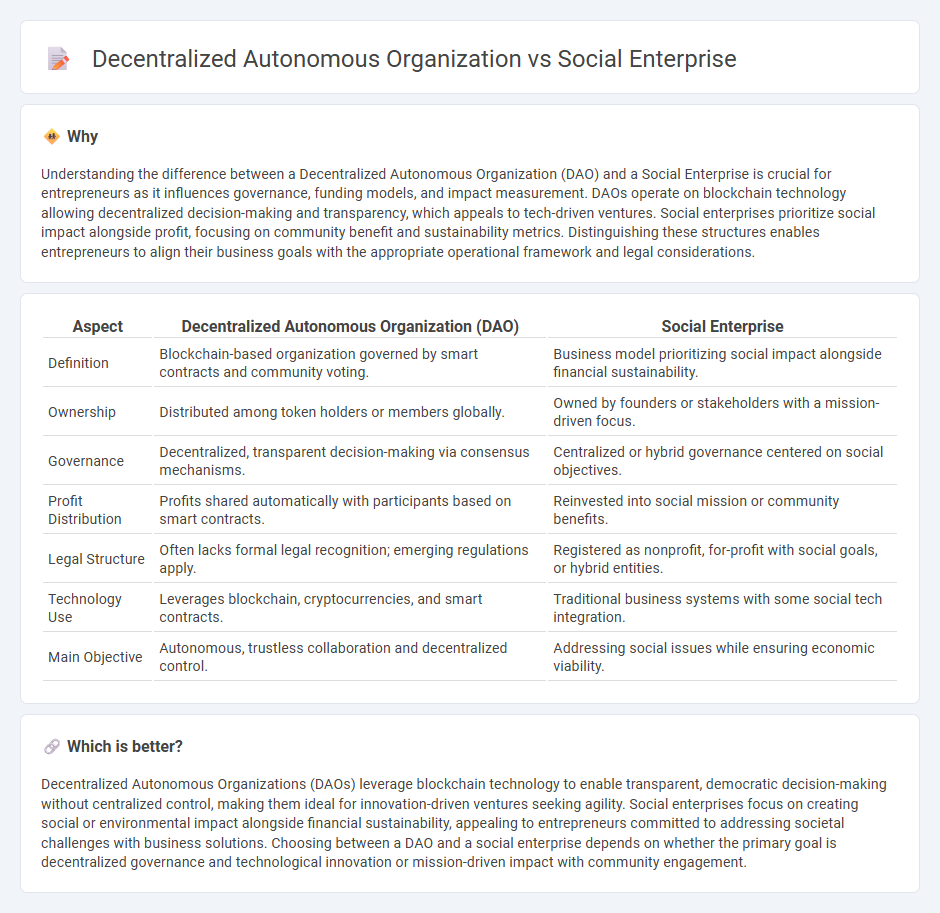
Decentralized autonomous organizations (DAOs) leverage blockchain technology to enable transparent, democratic decision-making without centralized leadership, revolutionizing traditional business structures. Social enterprises prioritize mission-driven models that balance profit with social impact, focusing on addressing community needs through sustainable practices. Explore how DAOs and social enterprises reshape entrepreneurship by merging innovation with social responsibility.
Why it is important
Understanding the difference between a Decentralized Autonomous Organization (DAO) and a Social Enterprise is crucial for entrepreneurs as it influences governance, funding models, and impact measurement. DAOs operate on blockchain technology allowing decentralized decision-making and transparency, which appeals to tech-driven ventures. Social enterprises prioritize social impact alongside profit, focusing on community benefit and sustainability metrics. Distinguishing these structures enables entrepreneurs to align their business goals with the appropriate operational framework and legal considerations.
Comparison Table
| Aspect | Decentralized Autonomous Organization (DAO) | Social Enterprise |
|---|---|---|
| Definition | Blockchain-based organization governed by smart contracts and community voting. | Business model prioritizing social impact alongside financial sustainability. |
| Ownership | Distributed among token holders or members globally. | Owned by founders or stakeholders with a mission-driven focus. |
| Governance | Decentralized, transparent decision-making via consensus mechanisms. | Centralized or hybrid governance centered on social objectives. |
| Profit Distribution | Profits shared automatically with participants based on smart contracts. | Reinvested into social mission or community benefits. |
| Legal Structure | Often lacks formal legal recognition; emerging regulations apply. | Registered as nonprofit, for-profit with social goals, or hybrid entities. |
| Technology Use | Leverages blockchain, cryptocurrencies, and smart contracts. | Traditional business systems with some social tech integration. |
| Main Objective | Autonomous, trustless collaboration and decentralized control. | Addressing social issues while ensuring economic viability. |
Which is better?
Decentralized Autonomous Organizations (DAOs) leverage blockchain technology to enable transparent, democratic decision-making without centralized control, making them ideal for innovation-driven ventures seeking agility. Social enterprises focus on creating social or environmental impact alongside financial sustainability, appealing to entrepreneurs committed to addressing societal challenges with business solutions. Choosing between a DAO and a social enterprise depends on whether the primary goal is decentralized governance and technological innovation or mission-driven impact with community engagement.
Connection
Decentralized autonomous organizations (DAOs) and social enterprises both prioritize community-driven decision-making, leveraging blockchain technology and transparent governance to achieve social impact. DAOs empower stakeholders through decentralized voting mechanisms, aligning with social enterprises' mission to balance profit with purpose by addressing societal issues. The integration of DAOs in social enterprise models enhances accountability, democratizes resource allocation, and fosters innovative solutions for sustainable entrepreneurship.
Key Terms
Mission-driven (Social enterprise)
Social enterprises prioritize generating positive social impact by addressing community needs through sustainable business models, integrating social goals with economic success. Decentralized autonomous organizations (DAOs) operate on blockchain technology with governance decisions made by token holders, often lacking a central mission focus. Explore in-depth comparisons to understand which structure aligns best with your mission-driven objectives.
Blockchain governance (Decentralized autonomous organization)
Decentralized autonomous organizations (DAOs) leverage blockchain governance to enable transparent, democratic decision-making through smart contracts, contrasting with social enterprises that rely on traditional organizational structures and centralized leadership. DAOs eliminate intermediaries and enhance stakeholder participation by embedding rules on the blockchain, ensuring immutable and automatic execution of governance processes. Explore how the blockchain-powered governance of DAOs revolutionizes organizational transparency and efficiency.
Stakeholder engagement
Social enterprises prioritize stakeholder engagement by integrating social impact goals with business operations, fostering collaboration among employees, customers, and community members to drive sustainable outcomes. Decentralized autonomous organizations (DAOs) leverage blockchain technology to enable transparent, democratic decision-making processes where stakeholders directly participate in governance and resource allocation through smart contracts. Explore the evolving dynamics of stakeholder engagement in both structures to understand their unique approaches and benefits.
Source and External Links
What Is a Social Enterprise? - The Annie E. Casey Foundation - Social enterprises are revenue-generating businesses with a mission to address societal needs like clean water, health care, or employment through innovative or employment-related models, blending nonprofit and for-profit structures.
What is a Social Enterprise? - Definition & Examples - Social enterprises prioritize social or environmental goals over profit, operate sustainably by reinvesting profits, and typically work in sectors where commercial markets have failed to meet social needs.
14 Social Enterprises & Examples: How They Impact the World - Social enterprises use business strategies to intentionally tackle social or environmental issues, reinvesting profits into their missions and often focusing on employment opportunities for disadvantaged groups and eco-friendly innovations.
 dowidth.com
dowidth.com